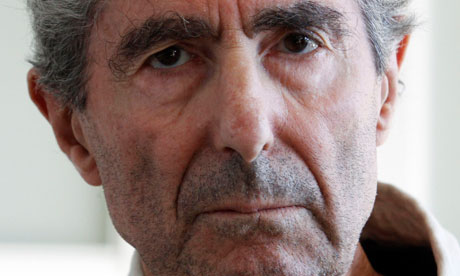Search This Blog
dinsdag 15 januari 2013
Philip Roth Names the Best of His Own Books
Philip Roth says that since retiring from writing, he wakes up each morning and has a glass of orange juice. Then he goes back to bed and reads.
"I'm doing fine without writing," he said Monday. "Someone should have told me about this earlier."
Roth's contentment will disappoint legions of readers who hoped that Roth wouldn't be able to stay retired long. The winner of the National Book Award and Pulitzer Prize, among many other awards, wrote 31 books, and was as productive near the end of his career as he was at any other time.
But Roth -- whose retirement made the front page of the New York Times in November -- said he hopes he won't find the inspiration to write another novel.
"I found it 31 times," he said. "I don't want to find it anymore. I'm tired."
Roth spoke at a Television Critics Association panel for the PBS American Masters special "Philip Roth: Unmasked," which looks back on a half-century of books that began with the publication of "Goodbye, Columbus" in 1959.
Roth has said that after completing his last book, 2010's "Nemesis," he reread all of his work. TheWrap asked him which of his books he believed were the best written, and he chose two from the 1990s.
"You write differently in each book," Roth said. "It may appear to be similar to readers but you're a different writer in each book, because you haven't approached that subject before. And every subject brings out a different prose strain in you. Fundamentally, yes, you're contained as one writer. But you have various voices. Like a good actor."
"I'm particularly partial to a book called 'Sabbath's Theater,' which a lot of people hate. Now, that's not the reason I like it," he said.
"But I think it's got a lot of freedom in it. That's what you're looking for as a writer when you're working. You're looking for your own freedom. To lose your inhibition to delve deep into your memory and experiences and life and then to find the prose that will persuade the reader."
He wryly added: "So I liked 'Sabbath's Theater,' I advise you all to read it."
"The other book I like very much is the book that follows 'Sabbath's Theater,'" Roth continued. "'Sabbath's Theater' is about a kind of giant of disobedience, Mickey Sabbath. He's death haunted and yet has great gaiety about his own death. He's an interesting guy, but he wouldn't be thought of as a conventionally virtuous man."
"In 'American Pastoral,' the next book, I wanted to write about a conventionally virtuous man. I was sick of Mickey Sabbath and I wanted to go to the other end of the spectrum. I think the book worked, enabled me to write about the most powerful decade of my life, the '60s, and the domestic turbulence of the '60s, and I think I got a lot of that into the book."
"There are other books I like too," he said, but those two stand out in "recent decades."
Roth also talked about the breakthrough success of his 1969 novel "Portnoy's Complaint." He said that when it became apparent that the book would get lots of attention -- in part because of its blunt sexual humor -- he took his parents to lunch to warn them.
Roth said he spent two hours telling his parents how to prepare themselves for reporters.
"I told them that it was not against the law to hang up on a journalist," he said.
After his mother died, Roth said, he asked his father what his parents talked about as they went home from that lunch.
"She said, 'He has delusions of grandeur,'" he remembered his father saying. "He was never that type of boy. He's going to have his heart broken because this is not going to happen."

